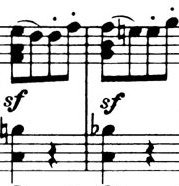|
Home
|
Nov 29, 2010
This week's themeWords with unusual initial consonants This week's words sforzando kvetch tmesis svelte llano 
 Discuss
Discuss Feedback
Feedback RSS/XML
RSS/XML
A.Word.A.Day
with Anu GargIs "czol" an English word? If you are a typical English speaker, chances are you haven't met every single word in the language, yet you may be able to tell with near certainty whether or not it's an English word.* How's that possible? Growing up with a language, we unconsciously learn patterns that occur in words. Any unusual combination of letters in a word we come across, such as the first two consonants in czol, stick out like a penguin in the middle of the Serengeti. Yet some words that have long been part of the language do sport unusual letter combinations, and yes, they are borrowings from other languages: fjord (Norwegian), cwm (Welsh), llama (Quechua), and tsunami (Japanese), to name a few. This week we'll feature five such examples -- words that have unusual initial consonants.
* Someone has, in fact, checked out every single word in the 20-volume Oxford English Dictionary and
survived to write a book
about it.
sforzando
PRONUNCIATION:
(sfort-SAHN-do)
MEANING:
adjective, adverb: With sudden force or strong accent (used as a musical direction).noun: A note or group of notes with strong emphasis. ETYMOLOGY:
From Italian sforzare (to force), from Latin fortis (strong). Ultimately
from the Indo-European root bhergh- (high), which is also the source of
iceberg, belfry, borough, burg, burglar, bourgeois, fortify, and force.
First recorded use: 1801.
USAGE:
"Establishing a driving rhythm with the barking of sforzando strings,
the piece remained complex, teetering between moments of brooding and
violent bursts."Penderecki Thrills Beijing; Global Times (Beijing, China); Oct 17, 2010. See more usage examples of sforzando in Vocabulary.com's dictionary. A THOUGHT FOR TODAY:
In the silence of night I have often wished for just a few words of love from one man, rather than the applause of thousands of people. -Judy Garland, actress and singer (1922-1969)
|
|
Subscriber Services
Awards | Stats | Links | Privacy Policy
Contribute | Advertise
Awards | Stats | Links | Privacy Policy
Contribute | Advertise
© 1994-2025 Wordsmith